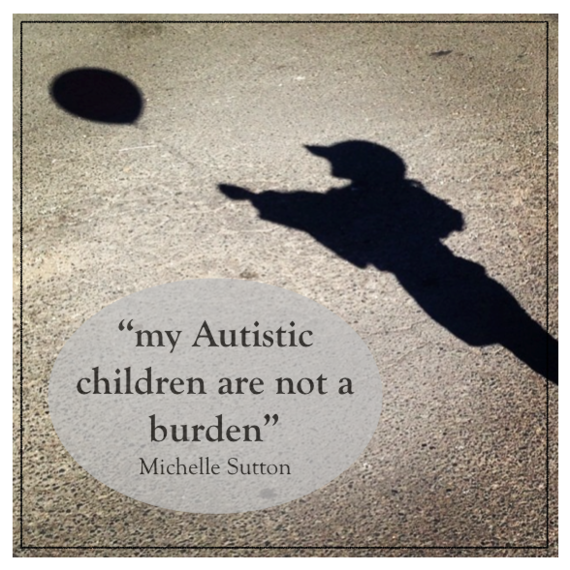I have two Autistic children.
When I say that, most people assume the response I desire from them is something along the lines of "I'm so sorry, that must be really hard".
I can understand why they think that is the expected response, because if you look at what is usually published in the mainstream media, on blogs and around social media, the message is overwhelmingly that Autism is a tragedy and a burden that causes suffering in the lives of parents unfortunate enough to have an Autistic child.
But I am here to tell you that when I say I have Autistic children, sympathy is not what I am looking for.
There is a side to Autism that not many parents talk about. The usual stories about parenting Autistic children that are published by the media generally focus on how hard the parents life is, how difficult the Autistic child makes day to day activities, and how much the parent suffers as a result of this.
The people who tell these stories- parents and professionals, "autism experts" and advocates- are not advocating for the needs and rights of Autistic people. They are telling the stories of parents looking for your pity. They do not have the best interests of Autistic people in mind when they spread their heart wrenching stories of "autism awareness". They are trying to get you to feel sadness, fear and guilt so that you will give money to their fundraising efforts.
There is a growing group of parents in Australia, and around the world, that wants to challenge this. Groups and organisations are forming and growing, like Autistic Family Collective, Respectfully Connected, and Autistic Rights Australia.
These parents do not see their Autistic children as a burden. They do not wish to make their children participate in therapies to treat Autism or make their kids appear more normal. They would rather the ability to access supports that allow their children to just be themselves in a world that is difficult for them, and give them a chance to follow their dreams and achieve their goals in their own way, at their own pace, in their own time. They love their children just as they are and do not wish they were not Autistic.
These parents are speaking up, but are often not published or quoted in news stories, even when they are interviewed for them.
Kiah is mother to an Autistic child. In response to being asked her thoughts on the representation of Autism in the media, she said,
"The needs of parents and those of Autistic children are very different, yet all too often they become merged by the parent and the result is that the needs of the child get lost in the negative rhetoric parents often use in order to raise awareness of their need for support.
"It is important, I think, to maintain a clear distinction between the two so that we avoid emotive descriptions, designed to cause a sympathetic reaction, when we discuss the private challenges of our children.
"Making public comments that are designed to engender sympathy for parents is incredibly damaging for Autistic people, who need acceptance and understanding of what and who they are, rather than the current, widely held preconceived, stereotypical views of what being an Autistic person means."
There are Autistic people, Autistic parents, speaking up to let people know that their lives, their children's lives, are not terrible and that they want to be respected, valued and heard, yet their voices appear even less in articles about Autism.
Cas is Autistic and has an Autistic son. She told me,
"My son is the most loving, beautiful, simply awesome human being that I have had the pleasure to get to know. On a daily basis, he amazes me with his insight, joy, and love of life. Yes, he may do some things differently to other children of his age, but different does not mean worse. Different means different. Yes, there are times when he struggles to cope with a world that wasn't built for people with his neurology. I share his struggles, and so we do things differently to some families."
I have six children. I can tell you without a shadow of a doubt that my Autistic children are no more or less "difficult", "challenging" or "stressful" to parent than my typically developing children. All children create work for their parents. That is what parenting is about- supporting the lives you have brought into this world. I do not blame my challenges on my Autistic children. One child does not have the power to ruin my every day life, no matter what their diagnosis.
I realise in my family we face challenges others don't. I know that some days are really hard. I acknowledge my life would look quite different if I didn't have my kids. But these things are true for all families. So it is not fair to my kids for people to blame our families challenges on Autism. It is not fair of any parent to blame their challenges on their Autistic child, and I think it is irresponsible of media outlets to continue to give parents a platform to do so.
My kids are not sick, tragic, broken, or in need of fixing. They face challenges set down for them by a society that does not want to accommodate their needs, and that makes them stand out in many situations. But no matter what you think, my Autistic children are not a burden.
You can find more articles and resources developed by Michelle Sutton by visiting her site "Michelle Sutton"
